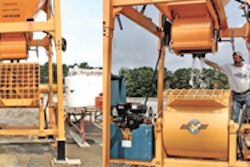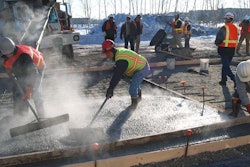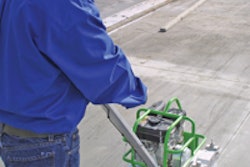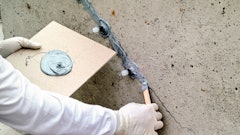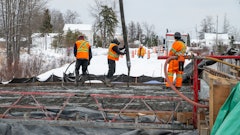
When concrete contractors think back on the jobs they've done, they can recall customers they'd like to work with again any time and others they would rather avoid, no matter how much money was offered. The same is true for ready-mix suppliers.
By learning how to be excellent ready-mix customers, concrete contractors are more likely to get prompt deliveries and perfect mixes every time and might even be offered better payment terms.
Plan your jobs
The best concrete contractor customers plan ahead. "They are the ones who realize that their time and our time is money, who are prepared when we show up on the jobs, who know the total yardage they need and who let us turn around our trucks quickly," says Ric Suzio, president of The L. Suzio Concrete Company. "They put their orders in in a timely fashion."
Suzio says other considerations that should be communicated in the planning stage are the speed of the pour, whether a buggy or pump will be used, and how far apart the concrete deliveries should be.
Timeliness for ordering might vary from one part of the country to another, depending on how busy construction work is locally and on the time of day the concrete is desired. Suzio says customers who want first-run orders, particularly during peak construction periods, should schedule their concrete a few weeks in advance. In geographic areas where construction is slow, a few days notice is probably adequate.
"The larger the project and the larger the delivery is, the more time we need," notes Dave Frentress, marketing director for Glacier Northwest. "For a 2,000-yd. pour, we need more time than a 200-yd. pour. It goes back to today's regulatory climate. If we're out of drivers' hours, we may have all the rock, sand and cement we need, but no drivers to get it there. That can be a real challenge operationally. We have a lot of jobs going and when we run out of driver hours, it's over. We have to schedule based on those regulations. Here we are with a plant loaded with materials and no way to get them to the customers. Those are government regulations and they're beyond our control. The contractors don't really understand that. Sometimes we have customers with big jobs to do but our hands are tied because our driver hours are used up."
John Hannon, president of Berks Products, notes, "Good contractors get our trucks in and out of the jobsite quickly. Idle trucks aren't profitable for the ready mix supplier. Delaying trucks on the jobsite causes further delays in the schedule for other deliveries." Showing ready-mix drivers the best routes for entering and exiting jobsites can also help suppliers.
Take pride in your work
Concrete contractors who do their work well get respect from ready-mix suppliers. "The best are quality contractors that do quality work with good reputations," notes Mike Kline, sales manager for Consumers Concrete Corporation. "It's the concrete contractor that is trying to elevate their industry and trying to put back into the industry to improve it. It's a person who has a passion for what they do, as we do, and who shares our passion for the industry. They have equipment that we like to have our equipment associated with. There's a genuine pride in what they do. They are professional enough to give plenty of notice and articulate enough to describe the job to us so we all know what we're up against. These are contractors that are quality driven and not price driven, where the quality of the materials is their first consideration."
Pay bills on time
Concrete contractors who pay their bills on time are popular with ready-mix suppliers. Each ready-mix supplier offers different terms. Some expect payment by the 20th of the month after purchase for all customers, while others offer terms based on a customer's credit history. At L. Suzio Concrete, payment may be due in 10 days for newer customers, while those with a long, positive credit history might be given 45 days to pay.
Paying fast can even save money for concrete contractors. "Our company offers a discount for early payment," Hannon points out. "Sophisticated customers usually try to take advantage of this term because it can add up to significant savings for them."
Communicate, communicate, communicate
Ready-mix suppliers are not mind readers. They want their customers to communicate clearly with them so they can be sure customers are getting the best product for the job.
"The better job that they do in describing what they're trying to accomplish, the better job we can do in supplying the right mixes that help them complete their job in a profitable way," explains Frentress. "If you need a 3,000-lb. mix, how are you going to place it? Maybe we have mixes that are more economical if you're going to pump it. We have a lot of technology that didn't exist 20 years ago. It's important to get that communication going, which goes back to architects and owners beyond the contractor. We don't just have plain old concrete; we have what you're looking for. If you don't talk to us, you may not know what you're looking for."
Kline stresses, "The contractor and the supplier should always look at a project as if they're partnering to do it. You rely on one another for the success of that job. And the ones who have that feeling are the ones who seem to be the most successful."
Remaining in constant communication with the ready-mix company as the job proceeds is equally important. "We all know a jobsite is a dynamic, continually changing place," says Hannon. "When they are able to communicate changes in their schedule, we can make changes in our schedule that ultimately allow us to respond better to everyone's delivery needs." He recommends that contractors invite the supplier to preconstruction and preslab pour meetings and approach each project as a collaborative effort between themselves and the supplier.
And if there is a problem, the contractor needs to tell the supplier. "We can usually solve those disappointments as long as the contractor communicates well," Kline says. Feedback on driver performance is also beneficial to ready-mix suppliers.
Loyalty counts
Ready-mix suppliers treasure customers who stick with them instead of shopping around for a better price. "They see us as a partner with that correct solution rather than just a supplier," Frentress says.
"Our best customers are our most knowledgeable customers," Hannon points out. "They understand that quality is more important than price. Poor quality directly affects their bottom line. They aren't willing to take the risk with a less reliable supplier."
But loyalty is a two-way street, something that must be earned. "You have to give them service; you have to give them quality," emphasizes Suzio. "Some people are going to solely price shop and those aren't the customers we want. We aren't selling an off-the-shelf product here. They have a design we have to meet. We're not always comparing apples to apples."
How to improve your ready mix relationship
By planning ahead and communicating as they go, concrete contractors can improve their relationships with ready-mix suppliers. "When we show up on the job and the customer is not ready or they order 30 yds. and they need 130, that delays our schedule for the entire day to get them the extra concrete," Suzio points out. "The next time around, that might be the reason why we're late on their job."
Hannon says, "Good concrete contractors don't automatically blame problems on the concrete supplier because they understand that proper placing and finishing techniques are equally important for a quality concrete job. They choose a supplier with a certified lab with certified technicians to ensure the quality of materials and product."
Kline prefers customers he genuinely wants to be friends with and likes doing business with so he's happy when they call. "The result is that everyone enjoys their jobs," he says. "It shouldn't be hard. I like to have a smile on my face and answer the phone with glad anticipation."
Being open to new ideas as the concrete industry changes will also endear contractors to concrete suppliers. "We as suppliers have several proven methods to improve concrete, but they all require different steps or additional training for the contractor," Frentress says. "The best contractors see these new materials as a way to make their jobs better or more profitable, while other contractors see them as an inconvenience. So if we think back 30 years ago, none of them wanted to pump concrete or use admixtures, and now that's the way things are done. With some of the newer methods or materials, there might be more hassles for the contractor, but the benefits are there for the owner and the contractor if they think about them.
"For example, an owner might request a building to be built with an insulating concrete forms system to save energy. The contractor needs to look to the supplier for the proper mixes and methods, especially if they haven't built with ICF before. Contractors can do a lot of upselling and increase their margins if they understand the new products," Kline concludes.
Read more Concrete Contractor articles at www.ForConstructionPros.com under the Concrete tab.




